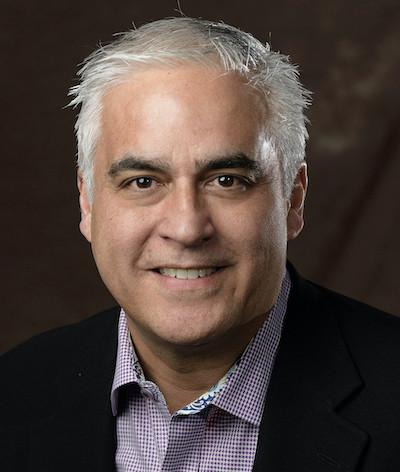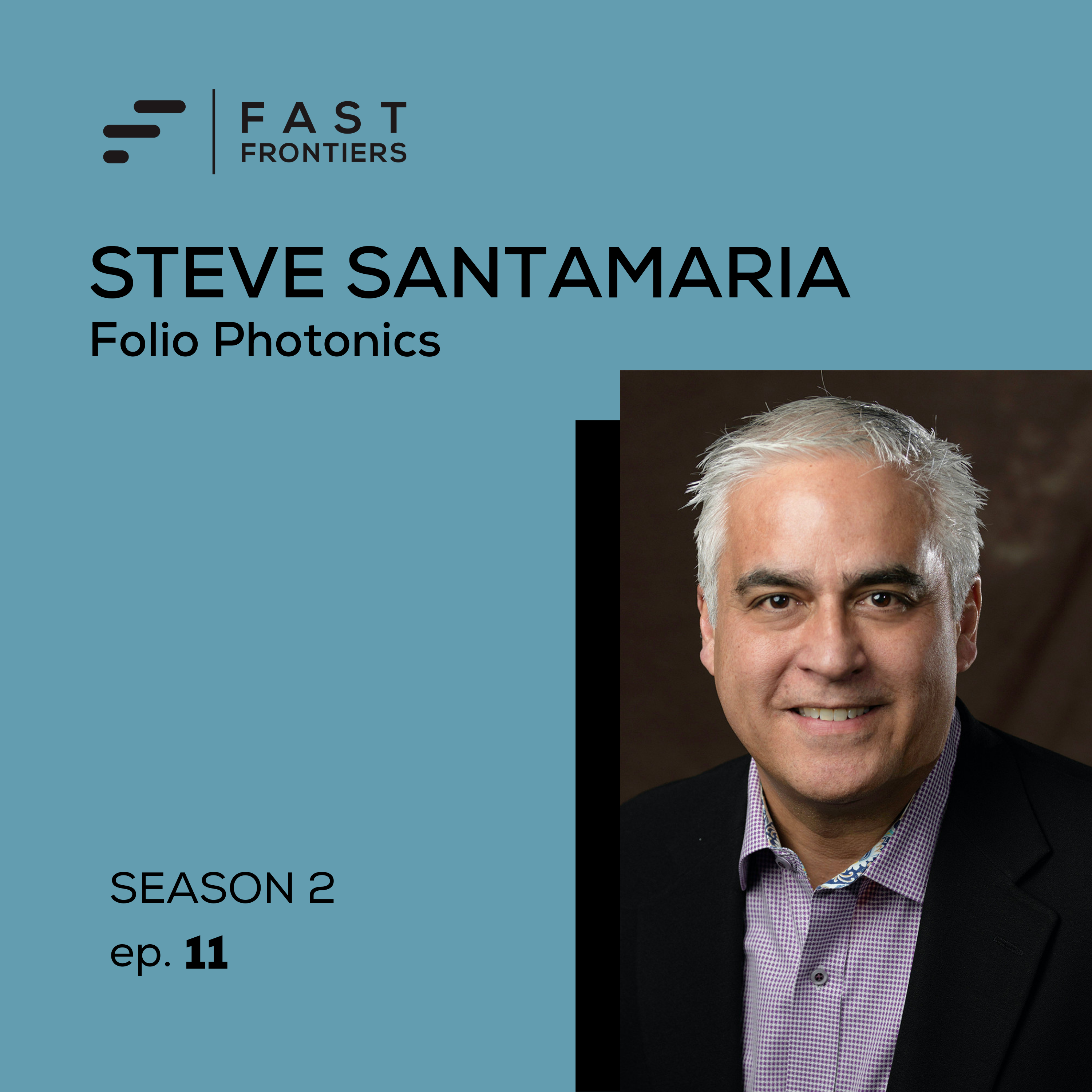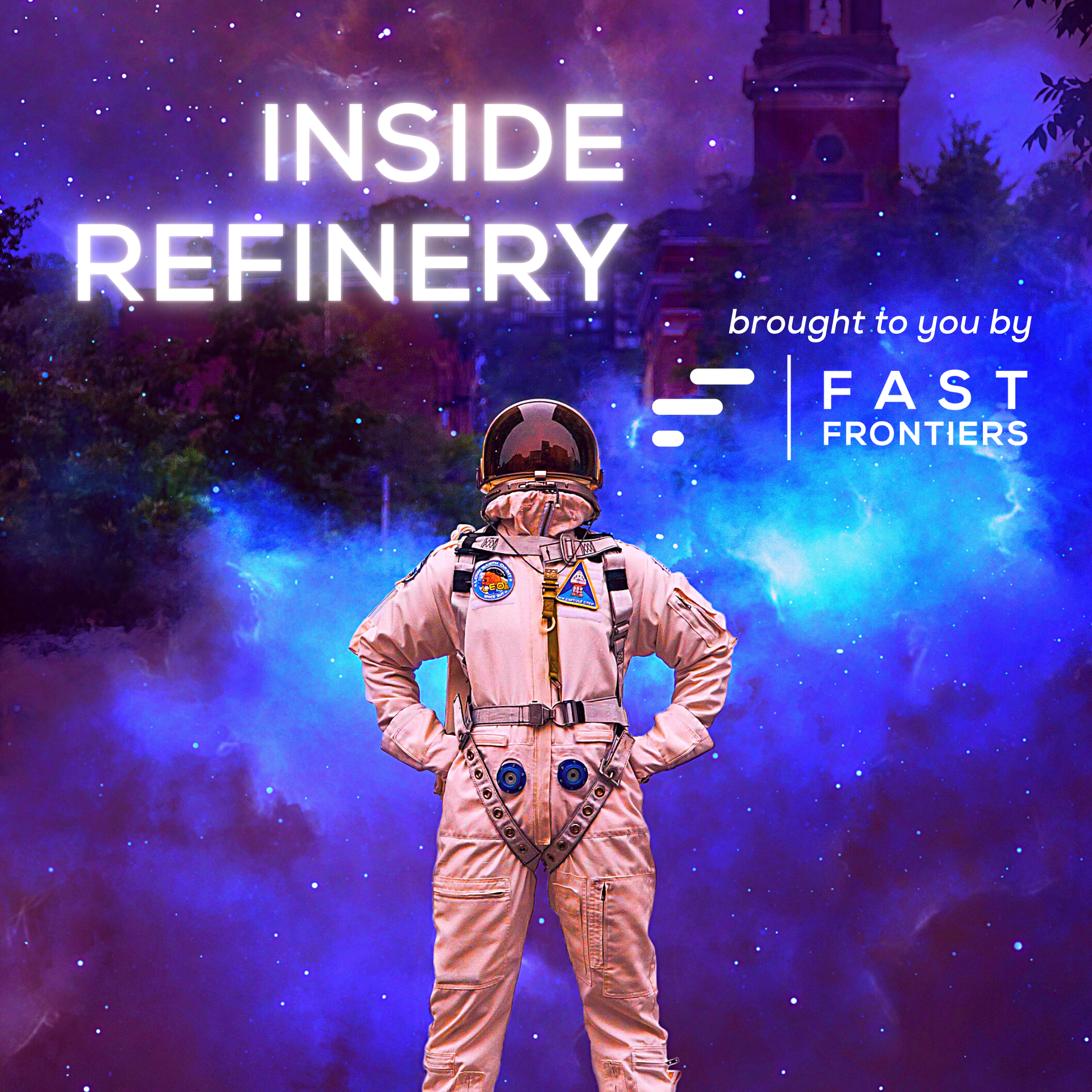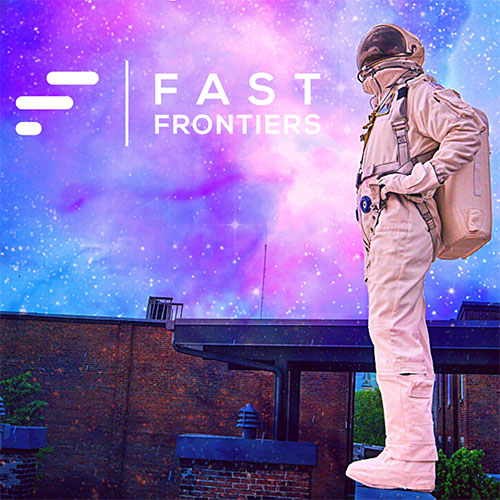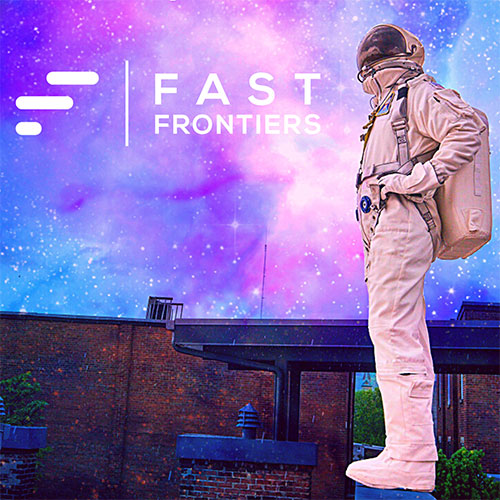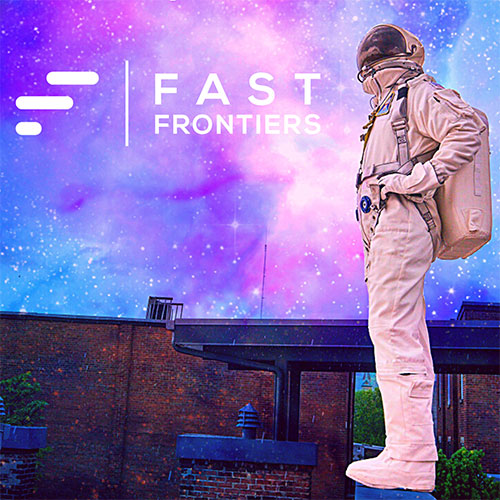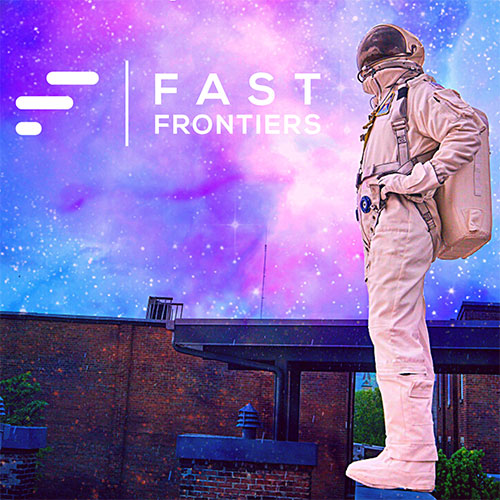S2 Ep 11. Steve Santamaria: Folio Photonics
- 0.5
- 1
- 1.25
- 1.5
- 1.75
- 2
Tim Schigel: Welcome to Fast Frontiers. I am your host, Tim Schigel, managing partner of Refinery Ventures. In today's episode, we're bringing you my conversation with Steve Santamaria, CEO of Folio Photonics in Cleveland, Ohio. In today's episode, we're going to dive into Steve's story and background as a boomerang, someone who moved back to Cleveland after working on the West Coast. We're also going to talk about how Steve manages the relationships with his board of directors using a Japanese concept called nemawashi. The biggest theme, or so what I hope you take away from this conversation is this, the value of boomerangs to startups in our region. The experience of working in the coastal, hyper-growth environment along with the connections that come with it can have a huge impact. Steve Santamaria is the chief executive officer at Folio Photonics in Cleveland, Ohio. During his 14 year career at Intel Corporation, he led a wide variety of strategic projects and managed the relationship with Microsoft. Steve has a background in sales, business development, and other startup experience. He's a seasoned technology executive, entrepreneur and student of disruptive technologies. Please enjoy my conversation with Steve Santamaria. Steve, welcome.
Steve Santamaria: Thank you, Tim. Pleasure to be here.
Tim Schigel: I should also point out the disclosure, Refinery Ventures is an investor in Folio, and there's a really important reason why a narrative to why we invested in Folio. I'll let Steve tell you more of the Folio story and how and why he made the decision to come back to Cleveland and then we'll get to later why we invested. Steve, help us understand your career, why you went out to the West Coast and what brought you back.
Steve Santamaria: Okay. Well, I'm a native Midwestern boy. I grew up in the Pittsburgh area. I went to Allegheny College. After college, my career took... My first jobs were in the Cleveland area and I lived here for a number of years in a variety of different sales roles. Company was acquired by Intel that I was a VP of sales at and when I got involved with Intel and the executive team that made the acquisition, they took a liking to me. They offered me a job to move to Seattle and to run the Microsoft partnership for Intel. That was really my first big jump into a very large technology company. I've been in sales at a lot of smaller startup companies, locally. I did well at Intel. It's a great environment for you to learn from some really, really intelligent people. And I partnered up with and I worked for Renee James, who eventually became the president of Intel, and she moved up the ranks. I moved up with her and she kept giving me fun projects to work on for 14 years, spanned the globe, did quite a bit of travel, did a lot of interesting things. But at the time, an end comes to everything and I had been working with Intel Capital. I had a team that did evaluation for deals that Intel would invest in or acquire companies and I got enamored by one of the companies where Intel's investing in and they offered me the job as chief revenue officer. I stepped out and took that job so I went from a very large company to an eight person company so I jumped real small, real quick. Did that for a year and a half or so and then it was sold and did well. Learned it's a whole different world, the startup world, compared to being big companies, a lot of the hard lessons.
Tim Schigel: What were a couple of the lessons that stood out to you making that transition from big company to startup?
Steve Santamaria: It's really about cash flow. When you're a startup company, you have to be mindful of your spend and scrutinize every spend. At Intel, if I went over budget, I would just go to another division head and I'd borrow a million bucks, $2 million, and no one thought anything about it. In terms of hiring, the assets were very fungible and more importantly, you're backed up by the big bank of Intel. You really couldn't go under because they would come... You might get your hands slapped for being over your budget, but in a startup role, you go over your budget, you're out of business. And so, that was shocking to work in those financial constraints and then also, just realizing you don't need as many people as you think you do. The analogy I always tell people it's... When we go on vacation, I tell my wife, "Take half the luggage and twice the money." Same thing with a startup, right? You need half the people but twice the funding. You don't need that marketing person. You don't need that office manager. You can do it yourself.
Tim Schigel: When did you start thinking that you'd move back?
Steve Santamaria: Yeah, it's interesting. I was in Seattle and after the VR company, I was doing a lot of consulting work and flying quite a bit, do a lot of stuff in Asia, particularly in Shenzhen, China. And it was there for two weeks, back for two weeks, back and forth for about six months, and that was not a fun lifestyle. And at the same time, I was interviewing and looking for opportunities in the Seattle area. My wife is from the Midwest with a very, very large family here and she encouraged me. She said, "Will you look back in the Midwest?" She's from Cleveland. She grew up in Cleveland. She has hundreds of relatives in this area because living in Seattle for 17, 18 years, we kept her far from her family. She goes, "Would you look?" And I go, "Wow, it's not really what I do, but yeah, I'm going to do it. I'll take a look." And I sent my resume to a friend who's part of the North Coast Angel Group here in Cleveland area and they circulated it. It was very serendipitous that this happened, that somehow my resume ended up at Case Western Reserve. They had a company they were spinning out. It was a high-tech, data center business, of which I'm familiar with its hardware, which matches up to me, and they're looking for a CEO. And so, I came down, met with them. What we decided to do is we do a try me, buy me. I did six months worth of consulting as a consultant, an acting CEO, reorganizing a bunch of things, chasing different business deals, getting it on the path to commercialization.
Tim Schigel: And had you moved yet at this point?
Steve Santamaria: No. My wife and family were still in Seattle and I would come down for, again, that two week on, two week off type of a scenario, then working remotely in Seattle. The advantage here is I got to live with my mother-in-law. I had a free place to stay when I came to Cleveland and I got to see all the family and my wife was a little bit jealous of the fact that I'm going out with all her cousins while she's back in Seattle. And then it became apparent four months into the agreement that we had, that this was working out and something that we would move forward with. And so, I came home, it was Thanksgiving of 2017, and we sat our kids down and said, "We're packing up. We're moving to Ohio." And that was a big moment.
Tim Schigel: I think there's so many different things we can learn from that. I mean, you're what I call boomerang, right? You understood the region. You had roots. At some point in your career, you decided it makes sense to come back. You had a, and your wife in particular, had a goal of getting back. The question then was, what are the odds you're going to find a tech company that leverages your background and skills in a place like Cleveland, Ohio, and who's going to help you through that process? I mean, it sounds like North Coast Angels was a big help, but that had to been challenging.
Steve Santamaria: Yeah. It's a different environment in Ohio than in Seattle, especially for a high-tech company. There are elements of friction that I wasn't aware of when I first came in and in friction, I mean that everything takes a little bit longer to get done because this is not a high-tech region that has a lot of high-tech startups. Some of the resources aren't available. Hiring, for example, is a big one that we have a challenge with, is trying to find people, optical engineers, servo technicians, these skills which are in abundance on the West Coast or in Colorado or in China are rather limited here in Northeast Ohio, and a lot of things I'm trying to do to change that. Our recruiting is recruit people from out of state and move them back also. You're not doing as much in-state recruiting. The opportunity, I think, is very strong and that's what makes people... We just hired five people in the last three weeks, so really excited and people are excited to come to work here, and then they get the added advantage. I mean, the advantage is cost of living in Ohio is much better than the cost of living on any of the coasts. And so, these engineers are coming back and they're making pay parity moves, but they're buying a bigger house and they're excited about getting into certain neighborhoods, especially if they have families and kids that they probably were not achievable.
Tim Schigel: Tell us more about Folio Photonics specifically.
Steve Santamaria: Folio Photonics makes a data storage product for archival data storage and it's one of the... If you look at the whole rise of the computer industry and the cloud, it's all driven by massive quantities of data being generated. And there's a dirty, little secret here is one of the reasons that it's so available... Everyone's heard of Moore's Law. I mean, I'm from Intel so we talk about that, how compute has gotten cheaper and more powerful over time. Well, at the same time, the capacity for storage has gone up at the same incredible pace. I have a hard drive from 1980 that went into an IBM mainframe. It was 18 megabytes and it costs $10,000. And now you have multi-terabyte discs. And so, the ability to store mass amounts of data, it lets all of these things happen, these streaming services, all this... The Amazons, the Googles, the world is all about data and moving data. And so, what Folio comes into saying, "We look at that data as an opportunity because the story of data, it comes with high costs. The media has a life, certain lifetime, and the needs have changed over time in that government regulation... People store data for a lot longer." When you put your pictures on Facebook, it's implied that Facebook is going to store that data forever.
Tim Schigel: In that example, that means if I record a video of my dog, it's sitting on a spinning hard drive for years, just in case I want-
Steve Santamaria: Forever.
Tim Schigel: ...to show you that video of my dog?
Steve Santamaria: Yes, and there's a large amount of data that sits and gets used just not used infrequently, but the commitment is we're going to store it. Now, we use an example that's a consumer one, but think about businesses. Businesses, they don't like to delete data, any enterprise, because you go through all this research and you're creating documents and you're creating material and you just don't know where the next goldmine is going to be. And with the rise of these new AI tools and machine learning, that we now have the capability to analyze massive amounts of data, but you can't analyze data if you don't have it. And so, these big repositories of data, it's coming a key point for the world. It's, who has the most data wins. I mean, they're already looking at Google and Facebook, how to break them up because they have so much data and no one can compete. And so, it's becoming a bigger and bigger problem and for us, it's a big opportunity. The Folio media, it's unique in that it can only have been invented in Ohio. Typically, when you make a disc, a disc has multiple layers of recording media on it and they're manufactured by spin coating, which is just laying layer by layer and-
Tim Schigel: And for our audience, we're talking about optical-
Steve Santamaria: Optical discs.
Tim Schigel: ...DVDs, Blu-rays.
Steve Santamaria: Blu-rays, et cetera. That's correct.
Tim Schigel: And how has optical historically been used, if at all, in data centers?
Steve Santamaria: It has a small niche in it. It primarily went into the consumer market because an optical disc, a Blu-ray, is perfect size to hold a movie. And so, vastly went out into the consumer markets. There was some people that use it for enterprise and the advantage of optical is that an optical disc lasts a hundred plus years, whereas a magnetic disc last five. If you want to save something for a hundred years, it's one optical disc verse 20, constantly migrating that data going through it.
Tim Schigel: Today, that data center manager has to choose, keep something on a spinning disc, and that spinning disc is going to fail every three to five years, or put it on tape, right?
Steve Santamaria: Or tape, magnetic tape is another alternative. That's right.
Tim Schigel: Which is really cheap but if you want to retrieve that data, it can take a very long time because you may have to spin through a mile worth of tape.
Steve Santamaria: That's correct. Those tape cartridges are a marvel of engineering, but they are half a mile long so if your first names on crosstalk the first inch and your last name's on the last inch, think how long it takes to spool that and that's the disadvantage of it.
Tim Schigel: You can retrieve data on a spinning disc and that's what they call time to first byte, right.
Steve Santamaria: Time to first byte, yes.
Tim Schigel : In one second. Tape, it would be sub-five minutes or something like that.
Steve Santamaria: Yeah, that's correct. I mean, if you look at the big archival services based on tape, your SLA agreement for retrieval can be hours because they have to find the tape, right? A robotic system finds the tape, pulls it, mounts it, spools it, and they move it. It could take five hours. I've seen services that offer, you get a day on your retrieval, but that's what you pay for. This is the opportunity for Folio, is to come into that market, which is pretty significant.
Tim Schigel: If optical hasn't really had a big presence in the data center why is that going to change with Folio? What's Folio doing that's different?
Steve Santamaria: Yeah. The challenge with optical in the past is they were very happy with the capacity at about 150 gigabytes per disc and they did not scale the same way that the tape guys and the hard disk guys did in terms of adding capacity. The more you add capacity, it just lowers that overall cost because they're going for consumer market. What Folio was able to do is we scale by adding additional layers through a unique to Folio extrusion process so we break the manufacturing paradigm and it allows us to get into multi-terabyte disc that vastly lower that cost. Then it becomes cost-competitive when you're talking about... I mean, we're talking about petabytes and exabytes and zettabytes, which are trillions of gigabytes of data being stored and we become very cost-competitive and you have the added advantage, well, it lasts for a hundred years plus. It doesn't need power. It can sit cold, right? All the advantages of optical come into play there because it isn't magnetic and it has a long life. And so, there are a lot of people that are very attracted to that business value proposition.
Tim Schigel: You're closer to a spinning disc in terms of time to first byte. You're not exactly the same, but you're closer and you have the storage and the data lifetime is longer than tape because there's no loss. There's no magnetic loss of any type and you have a lower storage, or energy footprint.
Steve Santamaria: And so, it's a great market for us and we look forward to it. We have a lot of interest going on. Worked with a number of partners in the US and then in Asia. Slowed down a little bit because of the COVID but we can do a lot of late night conference calls using Zoom.
Tim Schigel: I had heard about Folio technology, the technology optical data storage at Case, which is where I went to school, and I just glossed over it, right? It wasn't a SAS company, forget about it, hardware. And then one of our advisors, Bob Pavey of Morgenthaler fame, who's also from Cleveland, he's an angel investor and he brought it up to me again. And I'm like, "Okay. Yeah, whatever. Optical data storage." And then he told me about you and how you came together with Dr. Ken Singer and then that got my attention because your network, your experience you had on the West Coast with hardware and technology brought so much more because it's not about just the technology, but it's about networking into the industry and matching up the industry need with the solution. The storage market thesis was easy, right? It's death taxes and storage. Of course, we're going to need more storage. What's interesting is the nature of storage changing to this active archive layer you're talking about. You joined the company and you had some angel investors. Tell me about that journey and some of the challenges you were facing getting to the next step.
Steve Santamaria: Yeah, the company before I started, had done a note. It had done a first round of an angel round and raised $2 million. And that's when they decided, "Look, we got to get on a path to commercialization," but nobody in Ohio knows anybody in Asia, particularly, or the West Coast. And that's why when they found me, we had that first consulting agreement. And one of the things that they asked... We put on my list of deliverables as a consultant was to find a first set of partners that can give us feedback and help guide us. And I'm not technically from the storage industry. I am from a hard tech, hardware business so I took that challenge and the first thing I did was called a friend of mine, Bill, at Intel because I worked with him for 14 years and he ran Intel's Optane storage business. He was the big VP. I called him up and the advantage is, it's not a cold call. He knows me. I have his cell phone number. We've had beers together. And I say, "Hey, I have this startup that I'm working with. They're going into archival data storage. Who do I need to talk to?" And he's like, "Well, you should go talk to LITEON in Taiwan because they have an optical storage. This is their X Blu-ray maker and they're trying to move into enterprise with their own jukebox." And he's like, "The guy you need to talk to is Charlie Tseng, the CEO." He goes, "Hang on a sec," and he puts me on hold, comes back about two minutes later and he goes, "Hey, you're scheduled for a call with Charlie next Tuesday at 9:30, your time." It's that network to help me find the people. I probably wouldn't have found LITEON, let alone gotten an intro with the CEO without being able to access my network from Intel and people that I know on the West Coast and that's been the model throughout the last two years that I've been here is that as we identify these partners that we want to work with, whether they're software, they're hardware, where they're end user, like the Amazon as the Google cloud, et cetera, is that I go into LinkedIn and I can start working through my network. I know where I want to go and I need to find out who do I know? And fortunate for me, I've been in industry long enough that I have a lot of friends that are senior and a lot of them are in these companies and so it's very easy to get that first meeting. And it's all they can do is broker that, but it's a warm call and we usually get the meeting and then it's off to us to, establish the value proposition and move it through the process. But when I first came up with LITEON, I remember coming back and Ken and the board at the time goes, "How did you do that?" And I go, "Well, I knew Bill. It's Bill Leszinske, if I'm going to give him props, who knew Charlie, who gave me the new broker the intro." And they're like, "Well, no one in Ohio knows either LITEON or Bill." I go, "Yeah, that's the advantage." That's the boomerang thing, right? That's what these execs bring back, or people who come back from the West Coast, it's that network of people who they knew and where they are now and now you just try to marry that to some really unique technology that's starting to spring up in the Midwest.
Tim Schigel: Yeah, that's why it's so valuable for any ecosystem or region outside Silicon Valley to, I think, actively look for, support, recruit people like you with your background because it doesn't matter how good the technology is, right? I've talked to many universities and they got a bunch of great stuff, but they don't have the network to the people who really know, and you need to navigate that network and you need to do it quickly and with a high level of trust.
Steve Santamaria: Yeah. I'm involved locally now. Now that I've been a little bit more established, I get the boomerangs calling me up. The other big resource for us is the Folio board. We have a tremendous board of directors, of which you're part of, and you help in a lot of ways other than just funding and giving feedback to me, but also in networking and helping us connect.
Tim Schigel: Yeah, share the backgrounds of some of your board members and what they bring to the table.
Steve Santamaria: Well, you mentioned Bob Pavey and he's just a tremendous resource. We have the ex-CEO of Panasonic USA, Joe Taylor, who was very instrumental in helping us deal... We work with a lot of Asian companies and that is a whole different dynamic than the typical US manufacturers and there are certain traditions you have to follow and he coaches and guides me through that. Felix Brueck, who's retired from McKinsey, just happens to live in Cleveland, and he ran their data center business as a strategist, probably one of those strategic people I've ever met. Fantastic. On the financial side, yourself and Adam Sharkawy of Material Impact, guiding us through these different pieces. And Ron Richard, right? Ron's a local business leader who also was part of the US government and also Panasonic who helped us find Joe, but also connects us to In-Q-Tel because he was one of the original founders of the In-Q-Tel which is the CIA's investment arm. All of these people have a vested interest in our success. They're great people. Our board meetings are fun, right? It's about playing the, what-if scenario of how do we solve problems in front of this company? What do we need to do? I enjoy them. That's not always the case with boards.
Tim Schigel: With your board, I mean, you have a lot of folks that are not afraid to express their opinions, have a lot to offer. As a CEO, how do you process that and synthesize that and manage it?
Steve Santamaria: Yeah. We recently went through a pretty big pivot for the company. It's COVID-related and funding-related. The Japanese call it nemawashi, which is the ability to have the conversation before so it's not a free for all at the board meeting. Our pivot went into opening a second office in Colorado to take advantage of resources there, which is a pretty big commitment for a company our size to spend that amount of money. And then also, to build our own reader-writer that sits on top of the disc. And we've been working with partners and still continue to do so, but building our own design... We'll own both ends of the equation. It was something that originally we didn't want to do because there's a bit of money involved in building something like this. We got introduced to a certain team that became available in the Colorado area. They put together a plan and we wanted to pull the trigger on it, but it's a significant commitment for the company, a little bit of change from the past strategy.
Tim Schigel: What does nemawashi mean?
Steve Santamaria: In Japanese, it means an informal process of quietly laying the foundation for some proposed change. And it means, like you said, going around the roots so that when they would transplant plants, I guess, in gardening, in Japan, that they first dig around the plant they want a transplant and they take soil from the place where they want to move it to, and they put it around the plant for a couple of weeks. The plant gets used to it, then they dig it up and move it. And so for me, it's to come to a good decision, but understanding all of the objections before it happens, right? And it's especially important now because our board beings are not in-person. They're over Zoom and the Zoom piece of it, they're not connected with one another as much and you can't read body language as well. And so, what we did was in the two weeks prior to the board meeting, we softly introduced the concept going, "Hey, this is what we're thinking about. This is a strategic benefit to the company. It'll allow us to control our own destiny on the product side, but there's costs associated with it." And we just closed raising funds so we had funds available to do it, but this is how it impacts our burn rate. This is how it changes our roadmap. Laid out all the pieces to it and went around and heard your feedback. And some said, "Well," and I took that, got answers, and it set it up and made for just a very smooth board meeting. When we brought the topic up, it's like, "Okay, we've talked about this to most of you, or to all of you, but let's summarize it again. These are the steps we want to go through. These are the advantages. These are the challenges we will have to overcome." Got feedback from a lot of people on how to do this better and we want approval to go forward. And so, after 20 minute conversation, it was approved and there were no surprises. No one was surprised. No one was upset. No one was shocked. No one threw that wild objection out. It was just a very business-like conversation. It was a zen moment in the board, right? It was good. I like it.
Tim Schigel: It's very Japanese. I used to do work for Hitachi there years ago and yeah, you don't come out and make a assertion or declaration or decision. You make a suggestion. And if you see that people are all shaking their heads, then okay, then we'll move forward. But if they don't, then you know to do some more homework.
Steve Santamaria: Yeah, it puts more work on my shoulders, but I'm fine with that because it's... And when you bring it up beforehand, here are the rental properties. These are the costs associated with one-year lease, two-year lease, three-year lease, all these different things, it forces you to do a little bit more diligence. And when you offer, "This is the plan," then always one department goes, "Oh, I did that once before in a previous life," because they have this vast experience and they go, "This is how we managed it."
Tim Schigel : Let's talk about the help and what it's been like to work with one, Case Western Reserve University, where the technology and licensing came from, and then also, a little bit about recent events with JobsOhio.
Steve Santamaria: Okay. Our founder, Ken Singer is a professor of physics at Case, and the concept for this company was nurtured inside of his labs there, and the tech transfer office was part of it. We have our inaudible in Case. They've been super supportive in terms of, we have a number of interns and employees that come out of that pipeline, out of that school, as you can imagine. Where they can, they try to be helpful in making introductions to interesting, not only businesses but venture companies, because their reach is actually a lot larger than you would expect for a school that size. I mean, it's not like Stanford, but it's pretty significant and they've been helpful in doing that. They've been actively engaged in working with us from Ken's peers who are very knowledgeable of what we're doing and what we're up against. I appreciate that. I mean, I embrace the university as much as we can.
Tim Schigel: Well, before we get to JobsOhio, I guess it's important to maybe cover the other investor that came in first after us anyway, Material Impact.
Steve Santamaria: Material Impact, yes. And that was thanks to you. I mean, this is... Hat's off. We transitioned from angel funding to where we start bringing in more venture money. A couple advantages, a big one, check sizes are larger and you start bringing in people and companies that have skills and assets that can help the company move to the next step. My angel investors are super people. Not a lot of them are familiar in the materials space or the data center space or in high-tech, so you bring your technology background that helps us. You introduced us to, for example, the recruiter that we now use for hiring. It's that informal networking and then the day-to-day coaching that you provide me. Adding Material, that's out of Material Impact.
Tim Schigel: Yeah, and they're based in... Just so people understand, Material Impact's based in Boston. They just closed their second fund at $200 million and they're really good at frontier tech hardware, software materials, Carmichael Roberts, Adam Sharkawy. They have deep, deep, science, technology background and they're very good at working with the big elephants, the major industry partners and figuring out how to do licensing deals, et cetera. They seem like they should be the perfect partner for Folio.
Steve Santamaria: Yeah, they're a great fit. They've been now investors for about six months. We've had four board meetings and we've had countless other meetings beforehand and post the investment with Adam and then with Corinna. Been super, super helpful. We're in a project right now where they are actively engaged, where we are remapping the ecosystem. Now that we're a company that has a media, but a drive, now it changes dynamics of who you want to talk to and it opens up new vistas for us to work with, but it also gives the company even more legitimacy. As we start adding venture money in and these names, I noticed that the people that... The inquiries that we get, we get more attention on the coast, right?
Tim Schigel: Well, and I think there's a lesson there also for startups, again, in regions like the Midwest, or what have you. Could you raise enough money from investors, angels and individuals and family offices and venture firms in the Midwest to grow the company? Yes. But the network effect you get by bringing in some of the capital from the coasts is also... Well, it's way more valuable than the money.
Steve Santamaria: Yeah. Not all money is created equal, right? A dollar is a dollar, but a dollar with the soft benefit of access to the network, feedback and things, that's the $1.25 you get for the dollar invested. It's just the reality of it. It's a different conversation.
Tim Schigel: And it helped you with JobsOhio, right?
Steve Santamaria: And with JobsOhio. You alluded to that. As an Ohio company, we had looked for years at all the different entities that invest in Ohio. And for one reason or another, we never were able to connect and get a deal done. JobsOhio would come up on multiple occasions because they've heard about Folio. We're high-tech. We're hiring engineers and businesses that are growing. They're trying to help transition the state into more of a technology footprint. And right when the pandemic started, they said that they had opened up an innovation fund and they approached us saying, "Hey, is there something we can do here?" Privily, it's that funding, that larger chunk of funding that came in that allowed us now to look at the team in Colorado and move forward with that a little bit more aggressively, because they've extended our runway an additional year, year and a half, and gave us the ability to move a little more but it gives a little more freedom to move aggressively.
Tim Schigel: Yeah, I think, but it's a great example of how they can help support companies like Folio who are already shown to reduce some of the risks and have enormous potential for the state and for jobs.
Steve Santamaria: And then again-
Tim Schigel: It's a really great example.
Steve Santamaria: Back to the comment that, "Not all money is created equally." Since we did the funding with them, I did my first business trip since February. I drove down to Columbus to meet with the team who... We did this all virtually. I met with them, gave them an update, and before coming, I said, "These are the type of customers I'm looking to talk to. There are big data centers in the state of Ohio. There are big users, including the state of Ohio itself, big military installation in the town of Dayton." I said, "These are the people I want to talk to." And so, they set up additional meetings for me in Columbus with the Ohio Supercomputing Group, OARnet, and all these other people that are just... They're fantastic. I'm going to have a list of follow-up items from that meeting. As an Ohio technology company, realize that some of the largest customers in the world for data storage products are here in Ohio, help me get introduced and engaged with them, help the company. And they stepped up to that and they've done that and they keep looking, "What else can we do to help you out? How can we do this?" And so, they've been actively engaged also in terms of helping this company as we navigate this path to commercialization. Super happy about that.
Tim Schigel: Yeah, that's great. Well, Steve, obviously we have a rooting interest. Personally, selfishly want you to succeed, but actually, even more importantly, I think what you're doing for Northeast Ohio, for the state, to show how we can partner entrepreneurs with the tech and growth background you have with the technology that's coming out of so many of our great universities around the country is a great example and I look forward to being able to reference Folio as a huge success story. You already have a lot of success on your progress, but the opportunity is so enormous that I wish you all the best.
Steve Santamaria: Yeah. I think time is now for Ohio and if you're a tech startup company, this is a good place. There are a lot of smart people. They used to graduate from school and then they'd fly out West, but let's try to keep them in here and let's move them back. I mean, it's a great place to be, to have a startup right now and even in the two years that I've been here now, it's gotten better, right? There are more resources. People are figuring out what startups need. It's a good place to be right now. We're real happy here.
Tim Schigel: Yeah. Well, thanks to you, people will be inspired and you provide a great model. Thank you very much, Steve. Thanks for being on Fast Frontiers.
Steve Santamaria: Yeah. Thanks, Tim. I appreciate everything you've done for us, which has been a great deal.
Tim Schigel: You got it.
Steve Santamaria: All right.
Tim Schigel: Thanks for listening to Fast Frontiers. If you like our show and want to know more, check out our website, fastfrontiers.com. If you enjoyed this episode, please share it with others and give us a rating and review on your favorite podcast platform. Join us next week when we bring you my conversation with Jon Medved, founder and CEO of OurCrowd.
DESCRIPTION
Today we're bringing you my conversation with Steve Santamaria, CEO of Folio Photonics in Cleveland. We dive into Steve's story and background as a boomerang, someone who moved back to Cleveland after working on the West Coast. We're also going to talk about how Steve manages the relationships with his board of directors using a Japanese concept called nemawashi. The biggest takeaway is the value of boomerangs to startups in our region. The experience of working in the coastal, hyper-growth environment along with the connections that come with it can have a huge impact.
Please click on any related resources below for more information about what we discuss in this episode.
Today's Host

Tim Schigel
Today's Guests
